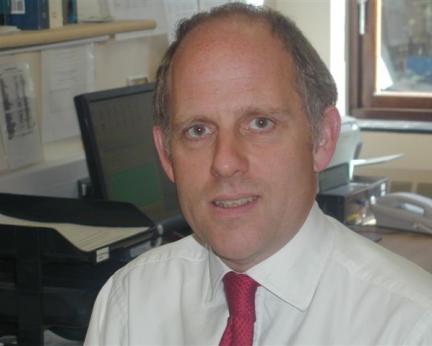The role is very varied and there are several distinct aspects to it. One aspect is direct patient care in outpatient clinics. I run a lipid disorders clinic and a diabetes clinic, as these are my main long-standing clinical interests. Patients I manage are from a wide age range from age 16 to the elderly. Much of this work is about reducing patients’ risk of future cardiovascular disease, including recommending appropriate drug treatment based on a good understanding of metabolism.
I am also part of a multidisciplinary (MDT) nutrition team, consisting of a gastroenterologist, two specialist nurses, pharmacists, and a dietician. We manage patients who are receiving parenteral nutrition (where patients are fed intravenously). My role as a consultant in this team is to advise when patients experience issues with their biochemistry or metabolism such as problems with blood glucose levels.
I spend one day per week in a district general hospital, where I do a ward round, visiting patients on parenteral nutrition. Both there and in my own hospital I also visit patients on the wards on an ad hoc basis when specific biochemical or metabolic issues arise. I particularly enjoy applying clinical biochemistry directly to patient care and so find this activity very satisfying. I enjoy discussing cases with junior doctors, who value the support and advice we are able to provide, and we often work in alongside doctors in specialties such as diabetes and endocrinology.
Like most departments, we operate a duty biochemist rota and this means that, about one day a fortnight, I am based in the laboratory looking at abnormal blood results that need interpretation, and answering queries from hospital doctors and GPs. Around 50% of our work comes directly from GPs. We also visit GPs and practice nurses to discuss our services and to provide training and education.
Within the laboratory, I work with closely with consultant clinical scientists. Clinical scientists are expert in scientific aspects of the specialty, or highly specialised areas such as paediatric clinical biochemistry who are not medically-qualified and don’t have responsibility for direct patient-care.
The day-to-day laboratory work is performed by biomedical scientists, and I work closely with these colleagues over a whole range of issues. This could be to do with the efficient running of the lab or with the development and oversight of laboratory tests. Chemical pathologists need to have a good understanding of all biochemistry tests. One of the great things about being a chemical pathologist is that we work closely with such a wide range of scientists as well as with medical colleagues and directly with patients.
In my previous consultant post, as a single-handed chemical pathologist in a district general hospital, I had management responsibilities as head of department. I am due to take up similar responsibilities in Bristol shortly. Management is an important aspect of the role of a chemical pathologist, as it is in any consultant role.
Over the course of my career, I’ve developed a particular interest in education and have had several senior roles in this area. I have been chief examiner in chemical pathology at the Royal College of Pathologists and for the last eighteen months I have been director of examinations there. I spend approximately one day per week on this work. Previously I was head of the Postgraduate School of Pathology at Severn Deanery (part of HEE South West), with responsibility for trainees from all pathology specialties in our region, and for a period of time I was also director of medical education in my trust. Finally, I also have had time to write textbooks in chemical pathology, though I have never taken on an academic role in a university setting.





